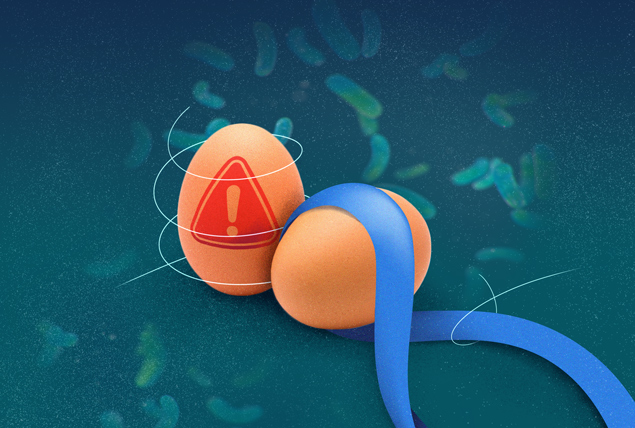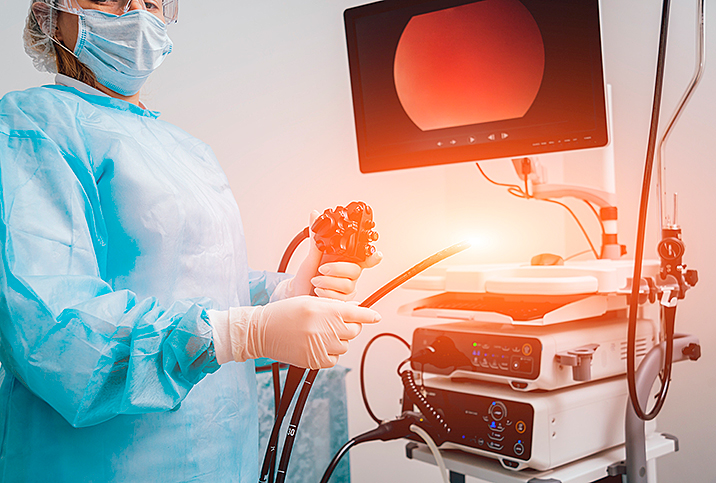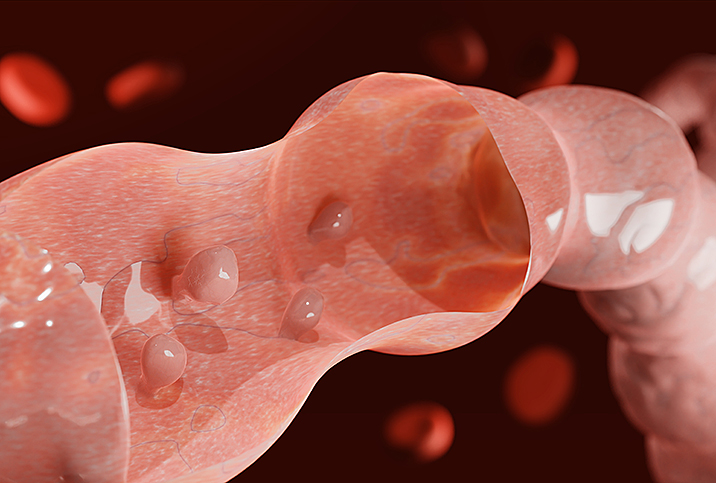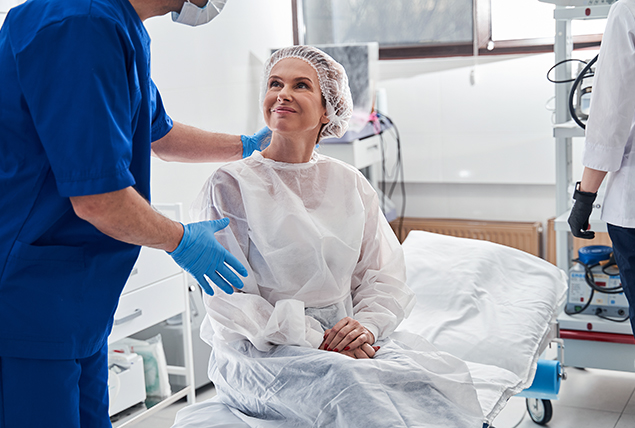Research Suggests Link Between Salmonella and Colon Cancer Risk

Most of us have heard of Salmonella as the most common culprit behind food poisoning—looking at you, egg salad at the outdoor family potluck. Such an infection may lead to longer-lasting issues, though.
A study published in December 2022 in the journal Cell Reports Medicine found a potential link between a past Salmonella infection and colon cancer. The retrospective study analyzed tissue samples from people who had routine colon cancer surgery and found that the people who had more advanced colon cancer all had Salmonella antibodies present.
Even more worrisome, further mice testing using tissue samples revealed that mice infected with nontyphoid Salmonella bacteria went on to develop larger, more aggressive colon tumors.
The study stumbled upon a troubling connection: Even one infection with nontyphoid Salmonella bacteria could be a potential link to accelerating the growth of colon cancer.
Salmonella and colon cancer risk: Chicken or the egg?
A study like this begs a couple of important questions:
- Could a Salmonella infection cause colon cancer?
- Does a Salmonella infection only accelerate the growth of colon cancer once it's already present?
There is not enough clear evidence that one case of food poisoning from Salmonella could cause colon cancer on its own, said Virginie Stévenin, Ph.D., a researcher in the Department of Cell and Chemical Biology at Leiden University Medical Center in the Netherlands and one of the study's authors.
Salmonella is a group of bacteria that commonly cause foodborne illness and affect the intestinal tract.
Stévenin pointed out that humans are constantly exposed to Salmonella in their environments, and some people can even get infected with only minor symptoms, so panic is not merited. However, this study warrants further investigation into whether infection could be the catalyst for cancer forming, especially for people with a predisposition to colon cancer.
"If they already were bearing some permutation, then this will be kind of the final push toward making the cell fully transformed and able to form a tumor," Stévenin said.
Salmonella can be a particularly nasty infection. It's a bacterium that invades the inside of cells and replicates and then "hijacks" the normal behavior of a healthy cell.
"[The bacteria] will try to dampen the defense reaction of the cell and also manage to honor some nutrients of the cell," Stévenin said. "So by hijacking the cell, we think that a long-term effect could be that then the cells are transformed."
Those effects include cells becoming more susceptible to potentially dangerous damage with each reinfection as a result of how Salmonella transforms the cells it infects.
"At the cellular level, nontyphoid Salmonella preferably infects [pre-]transformed cells, and each infection round exponentially increases the rate of transformed cells," the study concluded.
Previous studies done by this group have also suggested a link between gallbladder cancer and the type of Salmonella that causes typhoid fever, according to Stévenin. That strain of Salmonella is rare, however, and primarily isolated to areas of poor sanitation. Also, it is transmitted from human to human, not through food.
Taking a closer look
The study is an intriguing one, especially because it could explain the rising rates of colon cancer, but it's important to look at it from a wider angle, said Vincent Pedre, M.D., the medical director of Pedre Integrative Health in New York City and author of "The GutSMART Protocol."
While the study suggested a correlation between a past Salmonella infection and colon cancer, it's not enough to prove an infection causes cancer, Pedre noted. There is no causation. Still, a prior study done in the Netherlands looked at more than 14,000 people with a diagnosis of Salmonella infection. Researchers found an increased risk of colon cancer after severe Salmonella infection.
However, they also found that the combination of Salmonella infection and colon cancer occurred more frequently in patients who had a prior history of inflammatory bowel disease (IBD), which on its own increases the risk of colon cancer.
The bottom line? This study could mean a lot of different things. People who get infected with Salmonella could end up with a higher risk of colon cancer as a result. Also, other risk factors, along with an infection, could place people at a higher risk of developing cancer.
Should you talk to your doctor about your risk of colon cancer?
Colon cancer is on the rise, especially in young adults, and exploring all possible links to its development is a priority among many researchers.
"Colon cancer rates are increasing in men and women under 50 years old, which is a growing trend in the last couple of decades where colon cancer rates have nearly doubled in this group from 1995 to 2019," Pedre said.
Like almost all types of cancer, colon cancer has myriad risk factors. Stévenin noted that Salmonella infection is just one of them.
However, she said individuals who are at risk for colon cancer could certainly talk to their doctors if they have a known history of Salmonella infection to discuss whether additional preventive screening is warranted.
Other significant risk factors for colon cancer include the following:
- Smoking
- Alcohol use
- Eating a diet high in processed meats and carbohydrates
- Obesity
- IBD
- Activity level
"People with underlying IBD, like ulcerative colitis, are at six times greater risk of developing colon cancer than those with average risk," Pedre said.
Based on the study's result, he added that anyone with underlying IBD who has also had a known Salmonella infection might especially want to talk to their doctor about colon cancer risk.
"There is enough compelling evidence from mice experiences that shows that Salmonella infection increases the likelihood of colon tumors that anyone with known prior salmonellosis should discuss the best screening tool for them, especially if they have a history of IBD," Pedre said.
Colon cancer symptoms can vary from mild to severe, so depending on the severity of the symptoms, the location of the colon cancer and the size of the tumor, living with cancer—as well as undergoing treatment—can have many different impacts on someone's life, according to Pedre.
For instance, colon cancer treatment with chemotherapy and/or radiation could lead to side effects such as:
- Gut disruption
- Pain
- Weakness
- Hormone disruption that secondarily affects sexual desire and pleasure
Along with signs such as a change in stool habits or bleeding, your sex life could also provide a clue that it might be time to get checked for colon cancer, Pedre said. He suggested that if you notice any unusual new symptoms in the lower abdomen, including unexpected pain or cramping during or after sex, as well as an increased need to urinate or burning while urinating, you should talk to your doctor as soon as possible.
According to Stévenin, she and the other study researchers are not entirely sure why and how Salmonella transforms the cells it invades. What they do know is that this study is just the beginning. Each subsequent study they build upon will help reveal the link between infection and cancerous cells.
"The field of association of bacteria and cancer is a very active field of research, not only on Salmonella, but many other bacteria," she explained. "There is a strong community of researchers focusing on this topic, so I hope in the near future we can better understand those links."
Questions or concerns about your risk of colon cancer? Talk to a medical professional who can take your history and evaluate your situation. If you don't have a doctor you see regularly, telehealth makes it easy to connect with one. Giddy Telehealth is an easy-to-use online portal that provides access to hundreds of healthcare professionals whose expertise covers the full scope of medical care. Many of them offer same-day video visits.


















